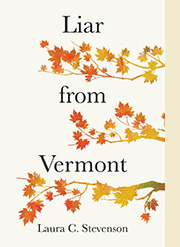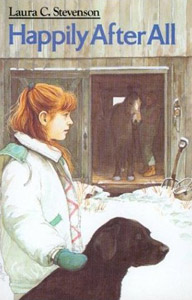A New Series: One Minute Reviews of
Books by Vermont Authors
Laura's column "One Minute Reviews" has appeared bi-weekly in Wilmington, Vermont's Deerfield Valley News since 2015. In April 2018, she found that no Vermont periodical consistently reviews all commercially published fiction and non-fiction by Vermont authors, so she started a series to fill that void. Published reviews from that series and some earlier reviews of local authors are listed with links to a scan of the printed copy. Reviews still in queue are listed without links until they appear in print.
The books reviewed in this series are available through Wilmington's Pettee Memorial Library, the Whitingham Free Public Library, and locally owned Bartleby's Books in Wilmington.
Deerfield Valley News, 7/26/2018
Middle Grade Vermont Book Considers Animal Ethics
Jessie Haas, Rescue. Boyds Mill Press, 2018.
Twelve-year-old Joni lives on a Vermont sheep farm. It's a wonderful life. She has a pretty (and willful) pony, Archie, she has parents who trust her to be free and responsible, she has kittens to civilize. But her two best friends live a considerable distance away, and when sixth grade ends for the summer, leaving the three of them considering the unknowns of the consolidated junior-senior high school they'll start in the fall, she really wishes they lived closer. So while it seems strange that Chess, a new girl who arrives in their sixth grade three days before vacation, she lives just down the road, and she might just be a nearby friend. Chess is nice, but she's also opinionated. She's a vegan, she explains to Joni. Not a vegetarian, who just doesn't eat meat. She doesn't eat anything that comes from animals: eggs, butter – and certainly not the sheep cheese for which Joni's father is locally famous. Furthermore, like the grandmother who lived with the family in California, she believes in animal rights: farm animals, kittens, dogs are slaves to people, she says. That's wrong; they should be free. Her opinions send Joni to her father in some confusion. Do sheep like to be milked? Is it cruel to shear them?
Oddly, Chess's theories aren't based on experience with animals. She's initially timid about feeding carrots to Archie, and she tells Joni they should spay their barn cat without ever having seen a kitten, until she meets Joni's. What really bothers Chess, though, is the team of miniature horses belonging to neighboring Mrs. Abernathy. She is sure they are being abused: Mrs. Abernathy drives them, and she's tall. She hitches them to a plow, she makes them pull logs, and they're too small! Worst of all, she makes them wear grazing muzzles, so they can't eat freely. Joni tries to explain that horses founder or colic if they eat too much grass, and the one riding lesson Mrs. Abernathy gives her demonstrates that the old lady knows a great deal about horses. But Chess is determined to rescue the minis, and one day, she "frees" them, with disastrous results.
It is a great tribute to Jessie Haas's skillful touch that this book discusses the issue of animal rights without sinking to didacticism. It doesn't duck issues: when Joni hears Mrs. Abernathy talk about the importance of caring for animals well because they are useful, she thinks, slaves were useful, too … As Joni's dad readily admits, his commitment to sustainable farming sits uneasily with the knowledge that his family eats some of the sheep he raises. That compromise is set beside pictures of unquestionable abuse: the picture of a bloody sheared sheep that Chess shows Joni, and mentions of agribusiness farming. But Haas also points out there is another cause of animal abuse: ignorance. Joni works at a 4-H shelter that houses one horse that has foundered on too much grass and another whose truly loving owner has starved it. Chess comes to realize she is guilty of that kind of ignorance herself – a point that is additionally softened by the gradual revelation that her parents have brought her to Vermont because they've been embarrassed by Chess's participation in her grandmother's animal-rights demonstrations. Told in Joni's convincing voice, the story demonstrates not just the necessity of knowledge, understanding, and respect for animals but the importance of love and forgiveness in human families.


